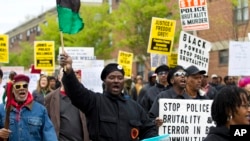Thousands of demonstrators marched Saturday through the streets of the eastern U.S. city of Baltimore, Maryland, vowing to shut down the city over the death of a young African-American man in police custody.
At least 1,500 people had gathered by midafternoon at the spot in West Baltimore where Freddie Gray, 25, was detained after a foot chase April 12 and placed inside a police transport van.
Baltimore's police commissioner said Friday that Gray had been denied timely medical attention for a spinal injury suffered after police apprehended him. Police have not explained how he sustained the injury.
Gray died April 19, and people continued to demonstrate in Baltimore since then, demanding justice. On Saturday, as two police helicopters circled overhead, many demonstrators carried signs reading "Stop racist police terror'' and "Jobs not police killings,'' and chanted ``Shut it down.''
Baltimore's mayor has joined the voices calling for answers. Mayor Stephanie Rawlings-Blake said Friday that she wanted to know why police officers did not call for medical assistance after Gray asked for it.
"If necessary, we will hold the appropriate parties responsible," she said.
Baltimore police said they would release information on their investigation of the incident late next week.
A family attorney told VOA that Gray's spinal cord was nearly severed after police took him into custody.
Baltimore police acknowledged Thursday that Gray was not wearing a seat belt while in the back of the van that took him to the police station. Police Commissioner Anthony Batts said officers were slow to recognize that Gray, who apparently had asthma, needed medical attention.
But Batts on Friday refused calls to resign. Six police officers, meanwhile, are on paid leave over the incident.
Gray reportedly was arrested when he ran away after making eye contact with a police officer. He was caught with a switchblade on his hip and was dragged into the police van.
"All [police] said was, 'He looked at us, and ran, and then we chased.' That doesn't meet any legal standard for stopping or arresting somebody," said Judge William Murphy, Jr., a lawyer representing Gray's family. "The only thing this kid did wrong by running from the police was that he didn't run fast enough."
Residents of the Sandtown neighborhood, where Gray was arrested, told VOA police have long mistreated the black community.
“They have been given badges to be bullies," said a young woman named Melissa, who said she lost her cousin in an unsolved stabbing last year. "They have been given badges to terrorize."
There is no justice, Melissa believes, even in the decision to place the officers on leave.
"Suspended with pay? What is that? You giving them a paid vacation for killing somebody?"
Shawn, another Sandtown resident, said he grew up fearing police. “This is the reason why we run — because we already know it's a 90 percent chance that if you don’t run, you’re going to get locked up for something," he said.
“It’s sad that we had to take this death, to get this type [of] publicity from the outside, when we’ve been calling for this for years," Shawn added.
The U.S. Department of Justice said this week that it also would review the case, which follows a string of high-profile police-involved killings that have raised allegations of abuses against minorities around the country.
"We can't bring Freddie back," Murphy, the family's attorney, told VOA. "But we can use this tragedy as an opportunity and as a stimulus to doing the right thing. Although that wouldn't be a fair exchange for a human life, it would mean that he didn't die in vain."
Some information for this report came from Reuters.





